You spent precious years on your novel. Sometimes it feels like your child. At other times it's your enemy. Your story is a part of you in every sense of the word. Then you had to edit the damn thing so much you considered printing it out to burn it. Having a billion edits under your belt, you're certain your novel is ready for scrutiny. You're so confident you envision an agent opening your manuscript and crying tears of joy because you presented them with the book they've waited their entire life to find. Slow your roll ... As the kids say. Your job is far from done. Now you get to fumble through the art of selling, which includes getting very familiar with the sting of rejection (probably over and over again). And it all begins with the query letter. After sitting through several agent panels (and happy hours) and listening to their cautionary tales, I developed a list of the top ways to shoot yourself in the foot. Ignore the Fine PrintAn agent or editor who takes the time to give you detailed instructions for submission on their website does this for two reasons:
Think of a query as an interview. Put your best foot forward by showing you can follow simple instructions. Details like “only send the first 10 pages” and “be sure the sample is double-spaced” are the first things agents look for. If you decide your story is more well-rounded at twenty pages, the agent has every right to reject your query before they read the first line. Don't give them a reason to think you're difficult to work with. Use the Same Query Letter for Every SubmissionYour query letter is your first, and sometimes only, introduction to the agent. Don’t waste your chance. Writer's Digest provides exceptional examples of successful query letters. There are also coaches and editors out there who can help you make a great first impression. Learn from the best, and sweat the details. Putting the wrong person’s name in the intro line is more than embarrassing. It’s a query killer. Query Multiple Agents at the Same AgencyCoworkers talk, which means if one agent at the agency isn’t looking for your kind of story, but knows someone down the hall is, they’ll pass your query along. It also means they’ll know you queried multiple agents at the agency. Trust me. It irritates them. A lot. Use a Non-Traditional Font It may seem like an opportunity to flaunt your uniqueness, but using an unusual font will get you as far as dressing up in cosplay for your in-person pitch session (in case you’re wondering, that’s almost as bad as following an agent into a bathroom to pitch your novel). Using uncommon fonts also makes your submission harder to read. Use ColorsPeriwinkle blue may be the color of your character’s hair, but it’s not legible against a white background. Tell me this color is a good idea. I dare you. In ConclusionThe whole point of a query is to make the agent or editor want to read your book. Do your research, use common sense, and don't forget to treat this like an interview.
These faux pas were tailored for a cold query submission, but apply to warm submissions after an in-person pitch. Are there lessons you learned while enduring the query process?
4 Comments
by Camela Thompson Today I met with J.H. Coates for his vlog/podcast (check out his channel on Youtube), and our conversation had my brain whirring long after we disconnected our video chat. In reading the synopsis for my book, he noticed my main character in All the Pretty Bones challenged the traditional role of female victim from the start. Olivia decides to hunt her stalker. He wondered if that was difficult for me because it flies in the face of some deeply ingrained cultural norms. What an excellent question! All the Pretty Bones was Olivia's first step into an evolution that (Spoiler) later leads her into a life as an apex predator. I desperately wanted to challenge the typical set up of normal, plain, boring girl meets wonderful vampire who sees something special in her despite her overwhelming normalness. Trust me, I've enjoyed those books, but I wanted something different. I wanted someone who had greatness locked inside of her, waiting for the right trigger into evolution. I wanted someone who had strength despite physical instability. For those of you who haven't read the book, Olivia faces ten years of persistent trauma by her stalker only to be diagnosed with terminal cancer. With nothing to lose, she decides to hunt her hunter. My primary challenge centered around her illness. There are dramatic physical limitations that accompany her condition, which presented giant issues that stood in the way. I couldn't Rocky my way through the book. She couldn't train herself into peak physical condition and chase down her tormentor. How can she fight when she can barely function? How can she run away and avoid being cornered? Weakness, fatigue, and debilitating headaches are just the tip of the ice burg as many of us have unfortunately seen. Asking for help is hard, but it's not a sign of weakness. Olivia does ask for help, and she asks it of a man. The majority of reviewers appreciate how its navigated, but not all. It was a very difficult balancing act. I didn't want her to depend on someone else, but I needed to approach the scenario realistically (I laughed at myself a little just then because VAMPIRES....but even fiction has to have some semblance of logic). In the end, she's forced to face her nature--on her own--before she's ever given the opportunity to tap into her power. It was difficult to challenge the traditional definition of victimized women, but it wasn't at all for the reason I thought. We are seeing more examples of strong female warriors in television, and this is a good thing. However, there is still a very long way to go. My friend and I decided to watch Tarzan together despite our reservations over the inevitable questionable messaging (she wrote a wonderful blog post on it here). While Jane showed intelligence, fortitude, and bravery, she was still the damsel in distress, relying on her husband to rescue not only her but all of Africa (big eye roll). In a bizarre twist, her spirit revved her captor's engines. Even her fortitude was sexualized. Right about now my family would be rolling their eyes, but look at how women warriors are depicted in video games, comics, television shows, and movies. One day I will sit down a costume designer and explain to them why it isn't practical to run around in three inch heels with long hair flowing free and only leather panties and bra when fighting bad guys. If you doubt me, here's what a search for "woman warrior" turned up in PIxabay: The search for "man warrior:" Can we agree the clothing ratio is a little higher on the second search?
To be fair, there are some wonderful exceptions to the typical depiction of the woman warrior. Miss Fisher's Murder Mysteries, Jessica Jones, Crimson Peak, Pan's Labyrinth, and The Girl with the Dragon Tattoo are just a few that come to mind. There are male writers who write women well such as Joe Hill, John Green, Stephen King, and George R.R. Martin. Their secret? Writing women as three-dimensional characters who have motivations, needs, and an arc. As an author, I view it as my responsibility to continue to challenge myself to overcome social tropes in my own writing. I haven't always succeeded, but I'm aware, and I'll keep trying. I encourage others to do the same. Have you seen good examples of women warriors in mainstream media? Please share examples. I'm always looking for my next book, television show, and movie. by Camela Thompson I have been thinking a lot about why I write lately. It takes a lot of energy to keep writing while marketing and working a demanding day job. The magic number of five books has been bumped up to ten before a writer collects the readership necessary to have a career. At first I rolled my eyes at these numbers, but it makes sense. Getting published is easier than ever with all of the self-publishing options out there, and the market is diluted. There are authors who have a break-out book, but I don't think anyone is certain why some take off and others don't. Your initial reflex when reading this is probably, "It's simple. Better writing." Not every time. Look at the top-selling books...I've read some great books (better books) that haven't performed well. My point is that deciding to be a writer often means working to sustain two careers instead of one. If writing in itself isn't fulfilling, it can be hard to keep going. When I first started writing, I didn't have a drive to be published. I have always been a voracious reader, but I had hit a streak of books that weren't the best. I kept imagining different ways for those books to end, and eventually I decided to try my hand at writing a better story. I can say with absolute confidence that I did not write a better story that first time. But I kept at it. According to reviewers, I'm doing better than okay. A strange thing happened as my stories evolved into a more distinctive style. The writing got darker. Honest to goodness I tried to write the light romance my mother hoped for (she takes my affinity for paranormal darkness as a personal affront to her parenting), but someone would die and off I would go with my darker mystery. Or worse. *Gasp* I like to write horror. As I wrote about demons (literally) and antagonists with dark urges, painful instances in my past unwound in a safe and distant way. I could change the outcome to be fair. It was a second chance at an ending that felt much closer to what a craved for closure. Writing helped me heal.
While I hope that my stories entertain people and transport them (and maybe get that justice they crave), I write for me, too. Why do you read? What motivates you when you write? by Camela Thompson Early in October I had the pleasure of participating on a panel on Women's Issues in Publishing. As we got ready for the presentation and looked at Patricia's deck (which can be downloaded here and has some excellent resources), we were both excited and depressed. The numbers are clear. There is still a disparity in publishing between men and women whether you're looking at who gets published, who gets reviewed, or who gets better pay (and a management position) in a publishing house. We've found stories posted by women who've spoken out about how their books are labeled (titles and covers) and the greater success they've experienced querying under a gender neutral name. Even after all of these statistics, we still have articles like this where people express their worry over an emerging publishing workforce dominated by women. It's daunting. And spouting those statistics and first hand stories to women writers in the audience had the potential to be discouraging. It isn't too surprising we were asked the question: "What can we do to encourage women writers?" There are many things that have helped me as an author, and I'm sure many of these points apply to any writer.
Don't Shove Someone into a Genre My husband and I were watching Crimson Peak, and we burst into laughter when the protagonist was told that she needed to focus more on romance. We laughed even harder when she decided to type her manuscript to hide her feminine handwriting. Lance turned to me and said, "Some things never change." There is absolutely nothing wrong with romance. Just don't assume a woman writes romance. If she does write romance, don't assume the writing isn't amazing. I still run into the Genre Gender Bias. Resist Bad Mouthing Constructive criticism is a good thing. What I have a problem with is talking behind another writer's back or blasting someone all over the interwebs. I prefer to leave critique to the reviewers. I know this won't be my most popular point, but I think there is enough negativity for an author without me adding to it. I have opinions like anyone else, but it's something I continue to try to live up to. Mentor You'd think writing a story from beginning to end would be simple enough, but there are so many ways to get lost. I've experienced most of them. Navigating technology, marketing, and all of the other steps during and after publishing is also overwhelming. Having someone to call who has already been there can make the difference between a former writer and a published author. Beta Read No one should write in a vacuum. After months on a project, even the most glaring mistakes become sneaky ninjas. A fresh set of eyes is a great thing if those eyes come with constructive criticism. Consider the differences in the following examples and decide what you would rather receive as a writer: "I don't like the scene." "I don't think Jack's reaction is believable. If he reacts this way, there needs to be a reason portrayed to the reader. Otherwise, I would emphasize the shock someone would normally experience in this situation rather than amusement." Another important quality in a beta reader is the ability to point out what the writer does well. A long list of problems without any positive points would discourage anyone. Collaborate It's awesome to see someone I've helped in some way succeed whether it be a pitch workshop, a beta read, or help on a marketing campaign. You don't need to donate the time it would take to mentor or beta read to have an impact. Kind words at the right time can make all the difference. There have been a lot of achievements women can be proud of. The all time Best Seller list on Amazon is dominated by women, and the New York Times Best Seller list from a few weeks ago held a healthy share. Women have blazed some very impressive trails, and it's up to us to keep raising the bar. Collaboration may be the key. How do you prefer to be encouraged as an author? Is there something you would add to the list? by Camela Thompson Any writer will tell you how hard it is to be published traditionally. In fact, other writers relish telling the horrors of their literary adventures. Go to any crowded writer's conference and make an off-handed comment about pitching, querying, or general discouragement in the vein of getting published and several people will be more than happy to commiserate with you. Publishing becomes this mystical thing that may only be obtained under the most superstitious and rare of circumstances. Because it's so difficult, once the goal is achieved there's a belief that every subsequent action will seem easy by comparison. If it's so hard to get there, the rest will be a breeze. Right? RIGHT? Not so much. Getting over the hurdle of being published is an accomplishment that should be celebrated. It's a rush I will never forget. But as I look back, I realize I had unrealistic expectations of what it meant. I'd quit the day job, crank out three wonderful books a year, and tolerate speaking engagements with Ellen. She'd laugh at my wit. We'd become best friends and bond over our love of animals and quirky humor. Then Tina Fey and Amy Pohler would join the party and we'd create the most gut busting tribute to feminism ever. While I still think we'd all get along famously, it looks like a pipe dream at this stage in the game. Plus, typing it out made it sound really creepy. For the benefit of others dreaming of their fast track to the best seller list and all that comes with it, here are some of my own myths that have been busted after publishing. I Can Quit the Day Job False. My best advice to anyone who wants to be a professional novelist: Find a day job you love. The median income for a traditionally published author is around $4,000. It takes a while to gain that much traction. After the costs of ordering my boxes of books, paying for online advertising, taking classes, and other writerly activities, I haven't seen a royalty check in my first year. Most of my sales are online, and while the volume isn't bad, the royalties are small. I've considered trying to ghost write or query articles, but it isn't for me. I make more money as an analyst and can afford to hire people to help me with things like marketing and cleaning, giving me more time to write. It's beyond rare to hit the jackpot with the first published book. It happens, but most of us begin our publishing journey with a book that goes largely unnoticed. Then we spend the next several years promoting the crap out of it while trying to write new masterpieces. These things are even harder to do when you have a job you hate. You'll need to work. Either find something that will give you flexibility to work on your writing, edits, and marketing, or find something you love. It doesn't matter if you love the product, enjoy the people, or like working for a cause - what matters is that you go home with energy instead of feeling drained. Writing Becomes Easier False. Writing is an artistic action that requires the participant to be willing to make mistakes. If you spend your time typing and deleting because the words aren't good enough, you'll never finish a book. I've found this to be especially true with a series. Not only do I worry about creating a story that is good enough, I worry about spending enough time on characters that my readers enjoy. I worry about making readers hate a character I love. I worry about my excessive usage of the words his, her, it, and was. All of these things crank through my head as I stare at the page, and it slows the words down. This isn't necessarily a bad thing, and I think it will get better. Eventually. Sometimes I manage to shut off the critic and the words fly. Too often, I spend an hour moving around sentences that could be spent getting the rough motions of a scene on the page. I know my writing quirks. It slows me down. But I'm becoming a better writer. Subsequent drafts are better. I Can Lock Myself Away to Write False. Writing in a vacuum is a bad thing. It's so crucial to get feedback on a story to see if it works for other people. Beyond that, having a system of support is critical. Whether it's celebrating over beer and bacon or strategizing over Google Hangouts or an impromptu pitch workshop in my living room, interacting with other writers keeps me going. The Marketing is Done for Me False. (This made me laugh hard enough to worry the dog.) Marketing should begin before you ever get a book out the door. Want to be published? Make a website and start learning about social media now. Start with one platform at a time, but start early. By the time your book is out the door, you should know which social media platforms your demographic uses the most and be able to use them. I should be posting to Facebook and Instagram a couple times per day. Twitter is more frequent. I blog once a week and post a podcast weekly. All of those things take a lot of time (about an hour and a half per day). Those are just online interactions. The in person stuff involves approaching bookstores to carry books and inquiring at venues for readings. Then there's mobilizing readers to review my books, request them in bookstores and libraries, and help expand my reader base organically. How to Get Ahead Listen to podcasts like The Self Publishing Podcast, Nerdist Writer's Panel, Writer 2.0, and Helping Writers Become Authors. Check out Nick Stevenson and his books on promotion. Follow your favorite authors on social media and take notes on what you do and don't like. Whether you're traditionally published, hybrid published, or self-published, we can all learn a lot from other authors who are successful. Even the famous authors have to put in their time interacting with the public. Just because getting published is hard doesn't mean it's not worth it. The best things in life are worth fighting for, and following your passion is no exception. Are there things you wish you knew before publishing? Are there things you're glad you didn't know? Are there things you need help with as a writer or published author?
by Camela Thompson If you read my post about writing a book in a month and a half, you're probably wondering how writing a book in a week could be a good thing. Last time I pushed myself, worked too hard, and snapped up an opportunity to take some time off. This time, it was different. An idea popped into my head and kept spinning around and kicking things until I had to write it down. After months of wondering if I would ever get another idea, I ran to my laptop. I typed for hours, only walking away to figure out where to go next. Within five days, fifty-thousand words had spooled out of my head and onto the screen. Even my loyal assistant grew weirded out with the amount of time I spent typing When I was young, I asked a ton of questions as I tried to understand how things work. I still do. It's why I'm an analyst during the day. It has always frustrated me when the answer to a question is, "It depends." I prefer answers to be straight forward and logical. It's why I often fall on my face as an artist. Now I have discovered that the amount of time it takes to write a book is fluid, and how that time passes--how it feels--also varies.
I started this hiatus from work back in April. It ends next Monday when I start up the day job again. In that amount of time I expected to write a book, maybe two. I spent the majority of my time writing chapters only to delete them. I started my third book in The Hunted series three times. THREE. None of them felt right and my editor agreed when I met with her. The good news is she helped me see what wasn't working. We brainstormed. It is a gift to have someone in my life who understands my characters and will let me talk it out. Plus, we met at a bar with hard cider and bacon. That took the sting out of learning I was looking at another rewrite. The next morning, I wrote some decent chapters. I feel optimistic that they won't be going in the trash bin, but the next scene didn't jump out and beg to be written. Being on the right path was enough. I accepted I would not write a book. Determined to enjoy the rest of my break, I scheduled time with friends. And then something happened in the last place I would expect: a movie theater viewing of Magic Mike XXL. The movie wasn't good so far as storylines and dialogue goes. The men were gorgeous, the dancing was great, and I will never look at Cheetos the same way, but I didn't give a rat's ass how Magic Mike got the bros together for the big show. But something Donald Glover's character said wound up something in my brain and it would not stop ticking: "...these girls have to deal with men in their lives who every day, they don't listen to them. They don't ask them what they want. All we got to do is ask them what they want and when they tell you, it's a beautiful thing, man. We're like healers or something." I write thrillers. Sometimes I even crank out horror stories. I don't do chick lit. But that line got me thinking about all of the women in the world who feel invisible. Ignored. It spoke to my history. What would drive a woman to seek validation of her existence? What would make someone crave acknowledgment on such a basic level, something that could be fulfilled by the simple question, "What do you want?" The answer: Emotional abuse. A character came to life in my head. I could picture her leaning over her sink in her shitty little apartment. I could feel the pull to wipe off her makeup in response to years of programming by her ex-husband--an ex-husband who had left her. This woman has good friends who rally around her now that she's not isolated any more. It isn't until she finds herself that he comes back because he can't stand to see her happy without him. I followed her down a rabbit hole and I ran to keep up. Scenes played like movies. When it was done I had a migraine and wondered if I had written fan fiction (I don't think so, but the migraine left me a little muddled). I have used this break to figure out where the strain and weight I felt last time came from. I've looked at ways to make life easier. I looked at different career options and asked myself what I should do with my life. I can't claim I have everything figured out. But I found joy in writing again. I had a new idea. Most importantly, I have faith that I'll have more. I have no idea what I'll do with this book--whether I'll publish it or even what genre it's in--but I feel lucky this happened. Now I have to apply the lessons from last time and not force the rest. by Camela Thompson
I was recently in an interesting Twitter conversation with @TheWriteMunz. He had heard my tirade on Jurassic World and wanted to know my opinions on Fridging versus a Red Shirt. First, let's start with the definitions. Fridging Fridging is a specific technique used to motivate protagonist characters into action. The writer creates a traumatic situation involving someone the protagonist cares deeply about. Often the protagonist's family member (or entire family), wife, girlfriend, partner, or best friend have something horrific done to them, usually ending in death. The body is left so the main character finds it and is further traumatized. The trope originates from the storyline of Green Lantern. Major Force literally leaves the protagonist's girlfriend shoved in a fridge for him to find later. I explained this concept to friend and she told me, "Once you know to look for it, it's everywhere." She's right and there's a reason. The death, mutilation, or rape of a loved one is a very compelling reason to seek vengeance. It's often seen in comic books and video games, but it's all over the place in television, books, and movies. Fridging Examples These are more obvious examples where the fridging incident is a main feature of the plot. There are plenty of movies, like Star Wars, where more distant characters are killed off to motivate a character into action (Luke Skywalker coming back to his Uncle Owen's farm and finding the crispy bodies of his uncle and aunt). Max Payne - A cop comes home to the gruesome murder of his wife and baby. His partner is also murdered. He sets out to bring the people who ruined him to justice. Supernatural - So many to choose from. The Winchester boys lose their mother, Mary, who is burned alive on the ceiling of baby Sam's room. Sam loses his girlfriend the same way, watching her burn. Both are motivating factors in their drive to hunt demons. There are many, many more characters shoved into refrigerators on this show throughout the seasons - Google it. The Barber - A cop is convinced he knows the identity of a serial killer and becomes obsessed. When the case is thrown out and his name run through the mud as a dirty cop, he shoots himself while his son is reading upstairs. Twenty years later, the son goes on a mission to bring the escaped killer to justice. The Fugitive - A woman is brutally murdered in her home and her husband is accused of the crime when he comes home to an active investigation of the crime scene. The husband escapes police custody in an accident and goes on the run, professing his innocence and searching for the killer along the way. Red Shirt The Red Shirt trope comes from the original Star Trek television series. If you've ever seen the show, you know that the characters in the red shirts have a limited life span from the time of their appearance (except for Scotty because he's a badass). Red Shirt characters have little or no direct tie to the main character and are used to move the plot forward. You'll see them most often in crime mysteries, thrillers, and horror. It's common to have a Red Shirt appear in the first chapter of a thriller to illustrate the presence of a killer (I've done it myself in All the Pretty Bones). A great example of this in television is Supernatural, which uses the trope not only to demonstrate the presence of a killer, but also hint at what it is and how it works. Why wouldn't it be okay to use these? I use the Red Shirt trope, so I'm not going to argue against it unless you rely too heavily on a limited set of main characters and only have appearances from people who strictly serve the purpose of dying outside of your core character group. There are people in the world who need to exist for things like gas stations, grocery stores, and police departments to keep running. Remove everyone and you have a problem unless you're intentionally writing a dystopian thriller. As long as we have stories with murderers, there will be Red Shirts. If someone doesn't die, there isn't a murder to solve. Fridging is more problematic and, honestly, a bit tired. I would challenge people to find more creative means of motivating their characters. There are a lot of reasons why people join the police force. Yes, some of them involve murder, but branch out! Maybe your superhero just has a psychological complex--those can be interesting without an entire family being slaughtered. The biggest problem with Fridging is the majority of victims are women and minorities. It's so prolific that the term Women in Refrigerators was coined a long time ago to capture the phenomenon. I gave a more equal opportunity range of examples above (dads are great fodder, apparently), but our straight white male protagonist is often motivated by something happening to his main squeeze. More examples of Fridges in Comics A great post by The Promethean Playground on why we need to do better 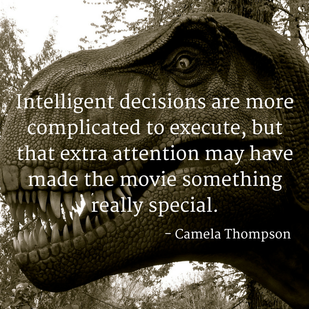 by Camela Thompson I was thirteen when Jurassic Park came out and it blew my mind. The dinosaurs were terrifying and lifelike. When I saw the previews for Jurassic World, I jumped at the chance to go with my friends. I wanted to bask in the nostalgic glow of raptors eating people. The premise was a little absurd--who would open a theme park after the first attempt failed on every level--but I was willing to overlook a lot in terms of logic and science. What I wasn’t expecting were the frustrating writing choices for the female lead in the movie. I couldn’t help the disappointment I felt as I walked out of the theater. When I first drafted this post, the frustration sang through. I articulated this in a conversation with my brother and was presented with an opportunity to approach this piece a different way. My brother was immediately irritated with my impassioned plea for change and viewed it as a fringe opinion because of my tone. His eye rolling demonstrated my need to take the emotion out of the argument and frame a logical critique with suggestions for improvement. Challenge accepted, bro. The hiring process for the chief position in a park that houses dangerous dinosaurs would involve an evaluation of risk management capabilities. This is especially true when the first park failed epically and a subsequent attempt on the mainland also failed. Someone as interested in park statistics as Claire would also understand how long it would take to get so many guests to comply with initial safety protocol. Poor attitudes and compliance were realistically illustrated when the relocation was finally ordered. Where I take an issue with the writing is that Claire didn’t even argue with the man who hired her to run the park. If she had insisted on initiating safety protocol, she would have realistically represented the position she had been hired to do, and there still would have been more than adequate time for carnage. No gore or film time would be compromised. A stereotype illustrated repeatedly for female executives is the barren ice queen: A woman who foregoes nurturing a family in order to climb the corporate ladder and embrace her inner control freak. Claire was no exception and the trope was embraced with enthusiasm. She didn’t know her nephews’ ages, delegated the responsibility of watching them to an assistant with zero qualifications, and printed up an itinerary for a date with the rebellious alpha dino-wrangler. Even when she was presented with a field of slain herbivores, her last articulated thought was concern for her nephews. There is nothing wrong with electing to not have children (it’s the decision I made), and we’re still human. A reasonable response would be check-ins with the kids at the hint of an issue, and a level of elevated concern once she discovers the nephews are missing and the ultimate predator is killing for sport. Just because we don’t have children doesn’t mean we don’t love our family. As an executive, it is imperative to learn how to effectively delegate. A successful business leader knows their weaknesses and how to balance them out with strong employees. Since Claire is running a multi-billion dollar operation, I will make the leap that she was successful prior to being hired. Arguing with the behavioral expert because of personal friction during a major emergency was grating. Instead of yelling everything short of, “You’re not the boss of me!” have Claire display frustration at her inability to fix the situation. It’s potentially amusing, but the motivation is a function of the situation and not her inability to defer to an expert. Also, sexual tension was understandable, but pausing to make out during a pterodactyl attack was asinine. The final point I will harp on is minor next to the others, but I found it grating because it was easily avoidable. Especially in a city like Seattle with a lot of hills, women tend to wear functional shoes and switch them out at the office. Even those of us who drive usually wear flats and switch to heels in the parking lot. In New York, where people are more fashion forward, women carry their heels in their bags and wear cute flats on public transit. A woman who has spent considerable time running a park and walking on heavy gravel would have functional shoes instead of risking ankle fractures. Cars and bags would be a great place to store these flats. I will admit I was impressed by how fast she ran in the heels. I wouldn’t have thought it possible. I wanted to love this movie. There were a lot of things I enjoyed. The dinosaurs (!!!), the youngest brother’s enthusiasm, and Jake Johnson’s character was wonderful among other things. Please don’t misinterpret the critique of the writing as criticism of the acting. Bryce Dallas Howard did a great job with what she was given. It wasn’t just Claire I took issue with--tropes were relied upon with multiple male characters. If I could change one thing, I would ask that the writers spend time developing depth in their main characters. As it was, the impression was that the writers believed the audience needed nothing more than special effects. Intelligent decisions are more complicated to execute, but that extra attention may have made the movie something really special. by Camela Thompson Thursday--May 28th--marked my very first book reading at a book store. What made it even cooler? It was the book store where I wrote the majority of Blood, Spirit, and Bone. I was excited and terrified. It was a great experience (thank you, Third Place Books and Michael G. Munz!). There were a lot of great questions posed during the Q&A session at the end of the reading, but one question stuck out in my mind. "How long did it take you to write your book?" When I answered that the first draft took me a month and a half, peoples' eyes bugged out. Specifically, my author friends' eyes bugged out. This leads me to believe that in the short amount of time I had to address the question, I didn't give a fair picture of that experience. When I said it took a month and a half, it was true. What didn't come across was that it was hell. So many things were sacrificed, including some sanity, in order to make the deadline. And you know what? That's okay. I chose to push myself, and I knew there would be consequences. I'm not writing this post to be a big baby whiner. I'm writing this because I see other authors discouraged by production rate, and it's important to know the good AND the ugly. In order to reach the fifty-two thousand words I needed to finish my book in November, I worked at my day job from 6 AM to 3 PM Monday through Friday. Add on another hour for commute. I had ten hours of the day dedicated to work, minus the occasional minute here and there jotting a note in a notebook when I had an idea for a scene. Add another two hours for taking care of the dogs, cleaning the kitchen, and dinner. In order to get up at 4:30 AM, I went to bed at 8PM. That left 1.5 hours to write. If cleaning couldn't get done in the two hours after I got home, it didn't get done. Certain rooms got priority on the list (bathroom and kitchen). The weekends were for marketing the book I had released in October and writing. Saturdays were spent at home writing. Sundays I spent at least two hours at Third Place Books writing with my writing group. I didn't have the energy to socialize. At home, this was my usual view: This picture makes my heart hurt a little. We lost Champ on December 2nd, but I spent a ton of time next to him in November. Any breaks were spent rubbing his belly and talking to him. It was a big upside to the mad dash toward a first draft.
My husband was amazing. He picked up a lot of slack on the chores, did the grocery shopping, took on dinner a couple nights a week, and was up for eating out more. Oh. And I ignored him. Often. We do the same day job and he would want to talk shop. I didn't have the energy for it. Thank God for football. It made me feel much less guilty about at least one day during the weekend and a couple days during the week. Writing is a very emotional thing for me, fraught with angst. Consistently, the third and two-third points come with a belief that I am not a writer and the book is garbage. A condensed timeline forced me to put the angst aside and keep marching on. The cost? I think the low point was when I stood in the kitchen looking at stacks of dirty dishes. Cue ugly toddler crying because I had to make dinner and just couldn't handle it. This happened a few times. If I didn't do certain chores, they didn't get done. Sometimes I was okay with that. Sometimes I was too fragile to deal with much of anything. I drank more, ate more junk food, and consumed coffee - all bad ways of chemically balancing out the stress. It has taken me a lot of time to cut out everything but the coffee and get back to exercising. Two books in a year brought me to my knees. I know of authors who crank out more. I don't know how. Was it worth it? I learned that I need more help if I go back to work full time and want to keep up the same pace. If I'm working and we have dual incomes, some of that money is going to hiring someone to help with marketing and a house cleaner. We've also talked about me going back part-time or doing contract work--the latter appeals to me quite a bit. What I know for certain is that doing things the same way and expecting different results would be foolish. I don't intend to paint a bleak picture, but I want it to be honest. I have accomplished things in the past two years I never imagined would be possible. I wouldn't take it back, but the experience has forced me to realize change is necessary to keep marching forward at the same pace. Do you work full time and write? How do you juggle both? by Camela Thompson
I was asked what I felt a strong female character should look like. None of the traits I listed were physical. Intelligence and emotional fortitude were the front runners - the willingness to persevere in the face of adversity. The individual who plods forward despite fear is a strong person, and those traits do not differ between the sexes. Strength in women, just as with strength in men, does not equate to perfection. In fact, the more adversity the character faces, whether it be in illness, disability, or environmental challenges, the more opportunity the author has to showcase the character's strength. To be honest, there are times I feel bad for my characters because I like to stack the deck against them and watch what happens. Yes, you may picture me cackling at my laptop as I drop another bomb on the battlefield that is my story line. I have to wonder why there is so much focus on building a believable female character. It's not hard to break from the archetype of ditzy, battered Barbara and her lack of self worth. Make your women people. Give them dreams, strengths, and weaknesses. Just don't let the weaknesses outnumber all else. Give her a brain. Let her be the one to walk along her journey without a man guiding her in the right direction. I look at strong women in the workplace and how people respond to them. Women are expected to temper their opinions. Intuitive and compassionate behavior is favored over strict rationality and assertiveness. If facts are baldly stated, they are met with resistance. Here's a great article on the phenomenon. Do people question how to construct a strong female character because they don't want her to come across as "bitchy"? Perhaps taking male traits - a straight shooter with quick wit and brutish strength - doesn't translate directly. Put those same traits in a female character and suddenly you're looking at someone who's "bossy" and "difficult." I'm afraid I have more questions in this post than answers. What do you think makes a strong female character? Why do you think there has been so much focus on creating believable female characters? What do you feel has been lacking? |
Camela ThompsonFreelance writer and Dark urban fantasy author featuring vampires with bite. My BooksCategories
All
Archives
July 2020
|
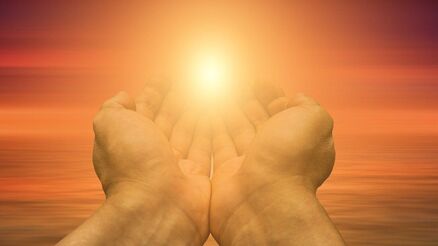
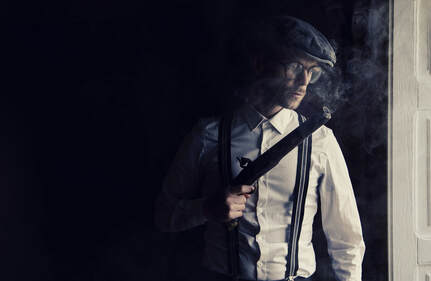
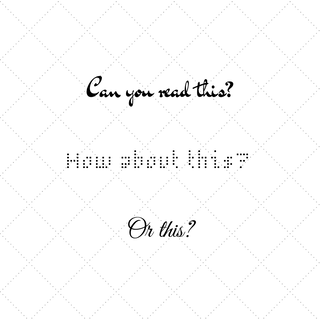
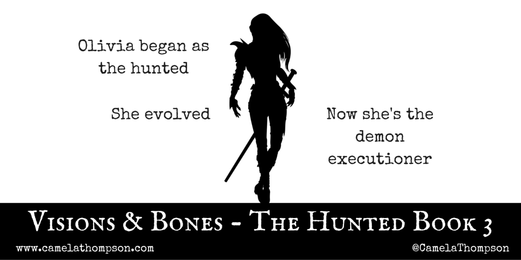
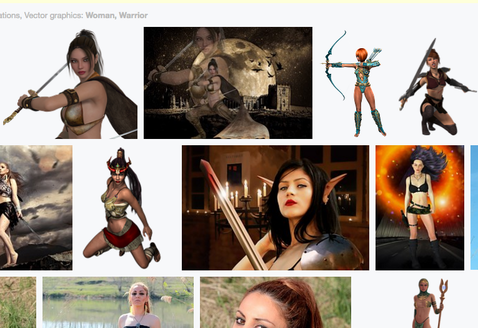
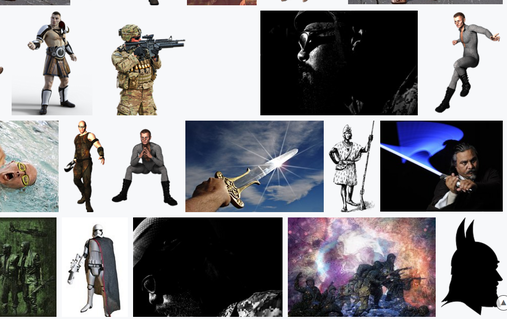
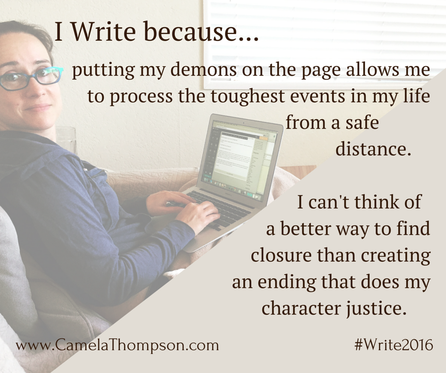
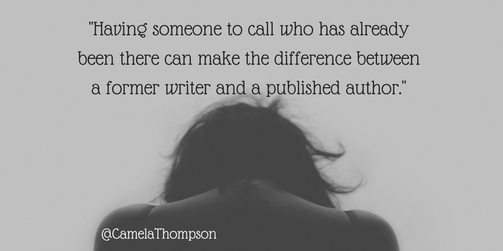
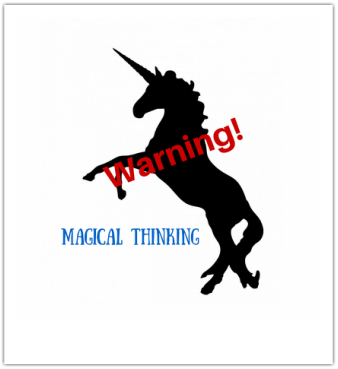
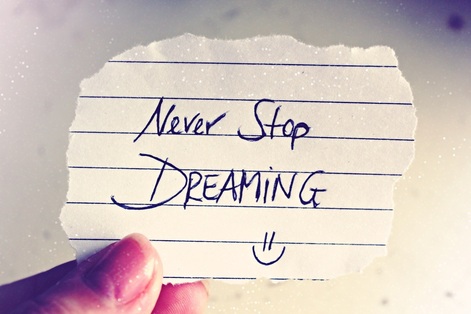
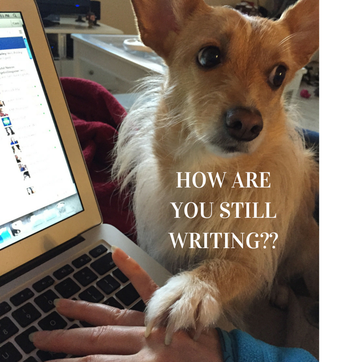
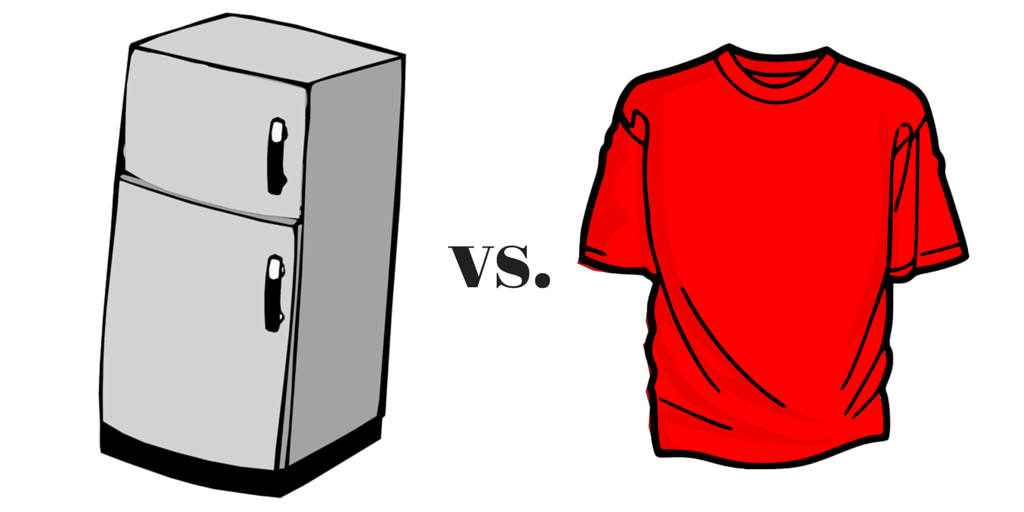
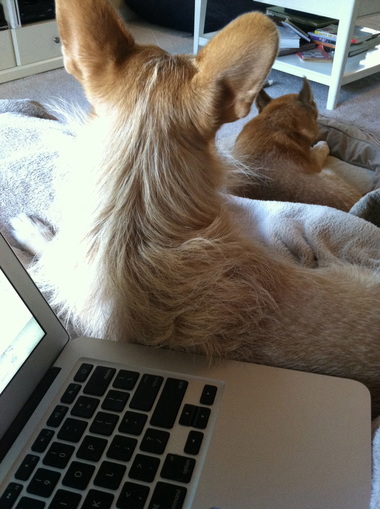
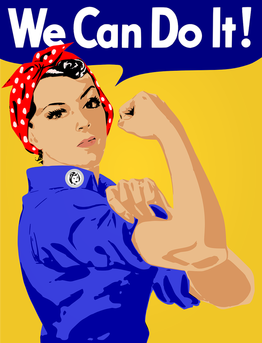
 RSS Feed
RSS Feed